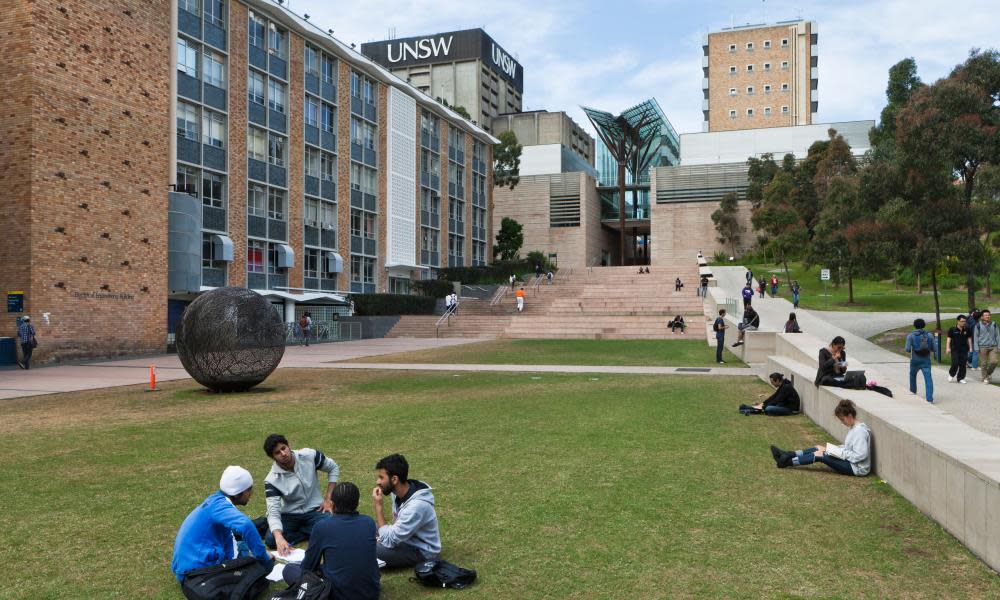UNSW faces backlash after deleting Twitter post critical of China's crackdown in Hong Kong

The University of New South Wales says it deleted social media posts promoting the comments of a prominent academic – calling for international pressure on China to temper human rights infringements in Hong Kong – because the comments were “being misconstrued as representing the university”.
The situation has mired the Sydney-based institution in an increasingly uncomfortable national debate about Chinese influence on university campuses.
Chinese state media said foreign students at UNSW demanded an apology from the university for promoting the comments that amounted to “blatant interference in China’s internal affairs”.
But after the posts were deleted, UNSW found itself facing a separate backlash from supporters of the Hong Kong democracy movement and free speech, who said the university’s actions amounted to academic censorship.
On Friday, the university published an online news story quoting Elaine Pearson, an adjunct academic at the institution and the Australian director of Human Rights Watch.
Pearson said she did not write the piece, but was approached by a member of the university’s media team to give her views on recent developments in Hong Kong and how the international community should respond.
Related: Australian government has no modelling on effect of university fee hikes, official reveals
In the piece, Pearson said the United Nations needed to establish a special envoy to monitor the decline of human rights in Hong Kong.
On Twitter on Friday, UNSW’s official account quoted Pearson and posted a link to the article.
“‘Now is a pivotal moment to bring attention to the rapidly deteriorating situation in Hong Kong,” the post said.
“@UNSWLaw’s Elaine Pearson says ‘now is the time’ for the international community to put pressure on China to wind back infringements on human rights.”
Early on Saturday morning, the post was deleted from Twitter, after an apparent backlash from Chinese students. Posts on social media platform WeChat indicate multiple students made complaints to the university and requested a response from the Chinese consulate.
Late on Saturday, the Global Times, a state-owned English language newspaper, posted a story that said students were “outraged” and that the “university’s behaviour brings shame to Chinese students”.
Pearson told Guardian Australia she was seeking clarification from the university about the situation.
“Clearly that discussion hit a nerve for some pro-Chinese Communist Party supporters who aggressively and collectively pressured the university to remove the story,” she said.
Pearson said the story also appeared to have been deleted from the UNSW website on Saturday morning and then re-posted soon after. The university’s newsroom – which includes links to its news items – does not include a link to the story quoting Pearson.
“Safeguarding the human rights of Hong Kong people is not something that should be controversial,” Pearson said.
Related: As I mourn my mother the pandemic rolls on. Is the whole world, like me, frozen in grief?
“Human Rights Watch has documented threats to academic freedom resulting from Chinese government pressure, and we’ve previously called on universities to ensure robust protection of academic freedom to deal with those threats – something Australian universities cannot afford to ignore.”
The Chinese-Australian political cartoonist, Badiucao, said the deletion of the posts was “an unacceptable disgrace”.
An unacceptable disgrace.@UNSW deletes tweet of an article about #HongKong human rights abuse by @PearsonElaine , AUS director of @hrw, over pressure from Chinese nationalists who r mobilized by Chinese app #Wechat (Weixin) and email Chinese consolate for “help” from Australia pic.twitter.com/CJpkcdnVwY
— 巴丢草 Badiucao (@badiucao) July 31, 2020
Kevin Carrico, a China studies senior research fellow at Monash University, said on Twitter that UNSW needed to explain why it had deleted the posts.
“This is plainly unacceptable,” Carrico said. “Australia is not China, and if you would like an education that includes PRC speech controls, that is available in China.”
UNSW needs to explain why it chose to delete its tweet and article.
This is plainly unacceptable- Australia is not China, and if you would like an education that includes PRC speech controls, that is available in China.— Kevin Carrico (@kevincarrico) August 1, 2020
In a statement, a spokeswoman for UNSW said the university “decided to remove the posts on our social channels as they were not in line with our policies – and the views of an academic were being misconstrued as representing the university”.
“The opinions expressed by UNSW academics do not always represent the views of the university. UNSW protects academic freedom and freedom of speech, respecting the right of academics and others to express their views within the law.
“UNSW provides a welcome and inclusive environment and is proud to have welcomed students from over 100 countries over the last 70 years.”

 Yahoo News
Yahoo News 
